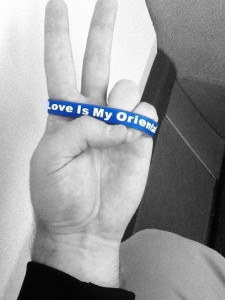This post is written by Michael Kimpan, The Marin Foundation’s new Associate Director. We will be properly introducing Michael very soon, but for now, you can read his thought provoking blog, hit him up on Facebook, and follow him on Twitter.
THE TRUTH ABOUT PEACEMAKING
A few days ago I wrote a post on my own blog highlighting and celebrating the potential for thoughtful, open and deliberate conversation regarding faith and sexuality from our friends across the pond as responses to Steve Chalke’s recent statement in support of same-gender monogamous relationships blossom around the blogosphere.
We would do well to follow suit in the ole US of A.
As a bridge building organization between opposing worldviews, The Marin Foundation has long advocated for peaceful and productive dialogue to take place between progressive and conservative communities in this conversation, even while acknowledging that neither side may ‘convert’ to the perspective of their opposite.
As Andrew has pointed out before time and time again, the role of a peacemaker is not to convert one side to the convictions of their opposite; rather, it is to focus on how to ‘peacefully and productively shift the medium of engagement between the two, by intentionally partnering with both and bringing them together.’
Activists and extremists on both sides, of course, lump this peacemaking position into some sort of secret allegiance and hidden agenda in alignment with whatever worldview is diametrically opposed to their own preferred perspective. With every ounce of stored up visceral hatred, ‘the Other’ (and the bridge builder along with them) is consistently demonized as simple-minded accusations, false generalizations and fear tactics fly in the face of reality and reason.
This process paralyzes peaceful and productive conversation.
As each side further digs into their polarizing, back and forth, us/them language , it becomes increasingly apparent that there will be no compromise and therefore no conversion. When that’s the unfortunate end-goal of your message, the logical conclusion is therefore to give up any hope of engaging in conversation.
‘What is there to talk about? They’re wrong – I’m right. And they won’t change their minds.’
Yet none of us benefit from ignorance and intolerance.
We desperately need relationship.
Many of the extremist voices I’ve personally encountered have absolutely no level of positive engagement with any representative from ‘the Other’ side. No wonder then, when the stereotypes and name-calling begins from one side, that the other side follows suit.
This senseless cycle needs to stop.
We are desperate for intelligent cultural engagement from high-profile leaders within these conversations. As opportunity for a volcanic eruption of emotional outbursts rounds the corner toward the straightaway of the SCOTUS decisions on gay marriage, it is imperative we reach hands across the divide and begin the work of reconciliation.
Regardless of our theological convictions, the way in which the church has traditionally approached conversations with the LGBT community has not been helpful. Rather than proving our insanity to the world by repeating the same behavior while expecting different results, I wonder how many leading voices within evangelicalism will take seriously the charge of Jesus to be known by our love – not love for God, or love for ‘Truth’ or ‘love for morality’ or ‘love for theocratic ideals’ … but love for one another?
We need real relationships, with real people, in real time. We need fidelity in friendship. We need a commitment to community. We need to sit at the same table as those with whom we disagree, engaging one another in respectful language and tone, with the promise of solidarity and listening in humility.
We need to commit anew to a message of reconciliation grounded in relationship.
Perhaps it would behoove us to re-orient ourselves around LOVE for one another -regardless of theological, political or cultural conviction. May we enter difficult discussion and dialogue – even debate – with the conviction and commitment not to destroy one another’s reputations, but to instead converse with maturity and grace in an effort to demonstrate to the watching world that we really do love one another.
‘it is by this that all people may know you are My disciples — if you have love, for one another.’
Much love.












